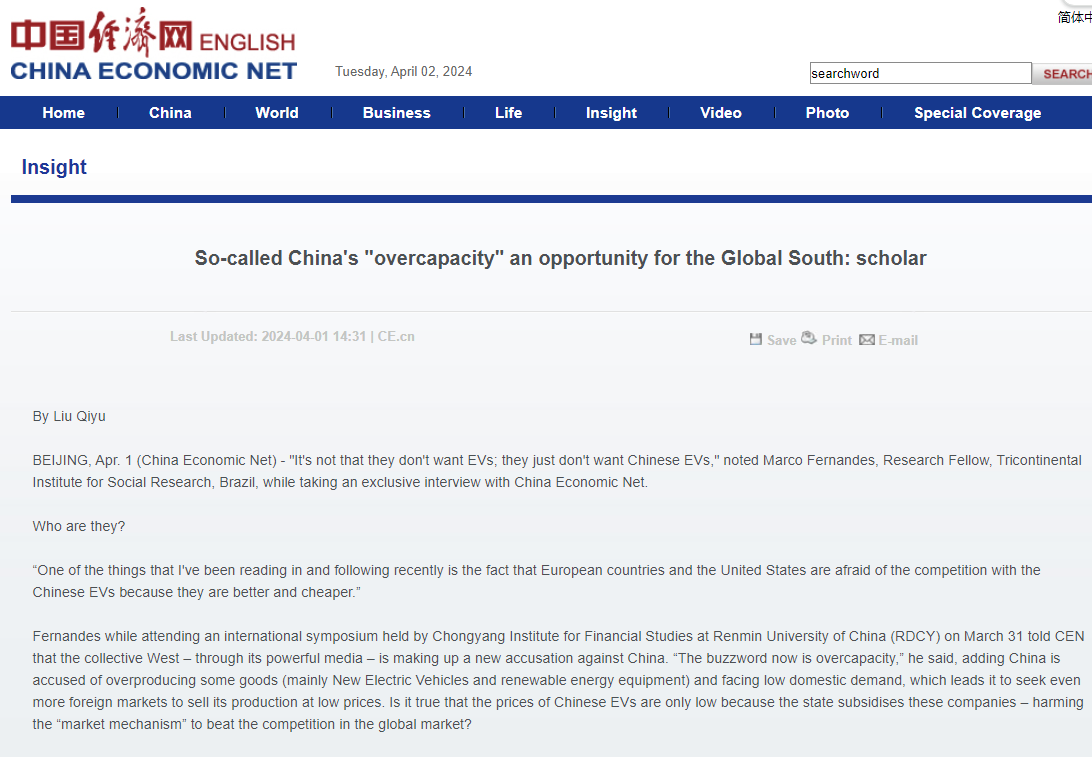LATEST INSIGHTS
Your Present Location: LATEST INSIGHTSMarco Fernandes: So-called China's "overcapacity" an opportunity for the Global South: scholar
Source: China Economic Net Published: 2024-04-01

'It's not that they don't want EVs; they just don't want Chinese EVs,' noted Marco Fernandes, Research Fellow, Tricontinental Institute for Social Research, Brazil, while taking an exclusive interview with China Economic Net.
Who are they?
“One of the things that I've been reading in and following recently is the fact that European countries and the United States are afraid of the competition with the Chinese EVs because they are better and cheaper.”
Fernandes while attending an international symposium held by Chongyang Institute for Financial Studies at Renmin University of China (RDCY) on March 31 told CEN that the collective West – through its powerful media – is making up a new accusation against China. “The buzzword now is overcapacity,” he said, adding China is accused of overproducing some goods (mainly New Electric Vehicles and renewable energy equipment) and facing low domestic demand, which leads it to seek even more foreign markets to sell its production at low prices. Is it true that the prices of Chinese EVs are only low because the state subsidises these companies – harming the “market mechanism” to beat the competition in the global market?
“This accusation is based on half-truths. Yes, the Chinese state subsidises many of its companies. So do the US, Europe, and many other countries around the world. It's part of the game of global competition. However, innovation and high productivity also help to lower the prices of Chinese products,” Fernandes pinpointed.
With high-quality craftsmanship, innovative designs, and competitive pricing, companies like BYD, NIO, Xpeng, Hongqi, and Lynk & Co are now winning hearts and minds in many countries. Not long ago, the idea that Chinese car manufacturers could make Germans feel “intimidated” seemed unthinkable.
But today, China’s auto exports have surged, reaching a record high of 4.91 million vehicles in 2023 as the country’s automakers expanded their presence overseas. The massive growth was propelled by a surge in the exports of new energy vehicles (NEVs), which soared 77.6 percent to more than 1.2 million units in the past year. The China Association of Automobile Manufacturers (CAAM) predicts that China’s NEV sales will reach 11.5 million in 2024, while total auto exports are expected to hit 5.5 million units.
“While the collective West deems China's 'overcapacity' a threat, it can be an opportunity for the Global South,” Fernandes told the reporter.
After substantial Chinese investments in infrastructure through BRI, recent developments indicate a higher level of cooperation between China and developing countries.
“Numerous partnerships between Chinese state-owned and private companies with Global South countries have been established recently, many of them related to local processing of high-demand minerals or the production of electric vehicles,” Fernandes pointed out.
For example, Bolivia has signed lithium agreements with Russian state nuclear firm Rosatom and China’s Citic Guoan Group; the government of Zimbabwe has signed an agreement with China-based private company Tsingshan, to set up lithium mining and processing operations in the country; the Moroccan government gave the green light recently for Chinese electric battery maker BTR New Material Group to build a factory near Tangier to produce key component cathode; Mexico and Brazil are also receiving Chinese NEV factories...
“There are high expectations that regional initiatives like the BRI, the expanded BRICS-10, and the Shanghai Cooperation Organisation can serve as levers to strengthen this process, even though they face opposition from Western powers. We need to deepen this kind of cooperation,” Fernandes said.























































































 京公网安备 11010802037854号
京公网安备 11010802037854号





